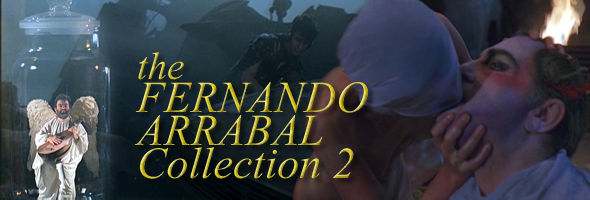
CAR CEMETERY
Color, 1983, 90m.
Directed by Fernando Arrabal
Starring Alain Bashung, Richard Leduc, Juliet Berto, Serge Fuillard, Dominique Pinon
THE EMPEROR OF PERU
Color, 1982, 81m.
Directed by Fernando Arrabal
Starring Mickey Rooney, Anick, Jonathan Starr, Ky Huot Uk
FAREWELL, BABYLON! / BORGES: LIFE OF A POET / ARRABAL, PANIK CINEAST
Color, 1993-2007, 109m.
Cult Epics (US R0 NTSC) / WS (1.66:1) (16:9)
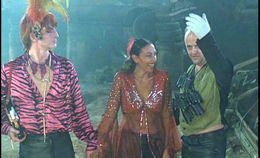 Most seasoned film fans had little to no familiarity at all with director Fernando Arrabal when Cult Epics unleashed two of his most startling films, Viva la Muerte and I Will Go like a Crazy Horse, as standalone DVD editions and then a later box set with another film, The Guernica Tree. Surreal, aggressive, smart, and often hysterical, these films were best received among fans of the director’s closest contemporary, fellow Panik Movement innovator Alejandro Jodorowsky, whose own return to prominence on DVD around the same time signaled an unusual cosmic harmony among the cinematic powers that be. Cult Epics’ second batch of Arrabal titles is
Most seasoned film fans had little to no familiarity at all with director Fernando Arrabal when Cult Epics unleashed two of his most startling films, Viva la Muerte and I Will Go like a Crazy Horse, as standalone DVD editions and then a later box set with another film, The Guernica Tree. Surreal, aggressive, smart, and often hysterical, these films were best received among fans of the director’s closest contemporary, fellow Panik Movement innovator Alejandro Jodorowsky, whose own return to prominence on DVD around the same time signaled an unusual cosmic harmony among the cinematic powers that be. Cult Epics’ second batch of Arrabal titles is 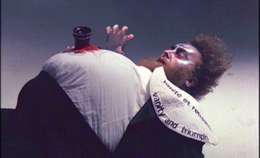 definitely not meant to be approached for anyone unfamiliar with at least one or two of his other films, but for those who know what they’re getting into, prepare for six hours of mind-spinning madness you’ll never forget.
definitely not meant to be approached for anyone unfamiliar with at least one or two of his other films, but for those who know what they’re getting into, prepare for six hours of mind-spinning madness you’ll never forget.
First up is Car Cemetery (Le cimetière des voitures), a production first shown on French television that plays like Godspell staged by New Wave clubbers dropping acid in a junkyard. The plot is essentially a string of vignettes echoing the life of Christ from the Nativity to crucifixion, albeit now populated by a bunch of eccentric characters including thieves, thugs, hookers, and a host of visual surprises like one character turned into a jarred homunculus. The messiah 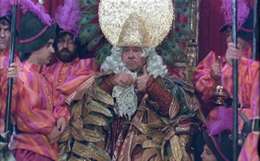 character, Emanou (Banshing), is also something of a musical savior (not named Tommy, however) whose plans for a grand live finale are thwarted exactly as you might expect. Not surprisingly, this originated as a stage play by Arrabal (and which was revived as recently as 2007 onstage in the UK), who has written over a hundred works for the stage, believe it or not. For most this will be the prize of the set as it closely reflects its creator’s style and vision, mixing social commentary, dark comedy, and plain weirdness together in a unique setting composed mainly of a nocturnal junkyard filled with dismembered vehicles creating odd and striking visual tableaux. Cult Epics’ disc, the first DVD availability anywhere in the world, claims to be a new HD transfer and certainly looks it, with excellent visual details and color fidelity in evidence throughout. The 1.66:1 framing looks accurate as well; there’s really nothing to complain about at all with the presentation here, and the optional English subtitles for the French dialogue are excellent. This is also the only film of the set available separately.
character, Emanou (Banshing), is also something of a musical savior (not named Tommy, however) whose plans for a grand live finale are thwarted exactly as you might expect. Not surprisingly, this originated as a stage play by Arrabal (and which was revived as recently as 2007 onstage in the UK), who has written over a hundred works for the stage, believe it or not. For most this will be the prize of the set as it closely reflects its creator’s style and vision, mixing social commentary, dark comedy, and plain weirdness together in a unique setting composed mainly of a nocturnal junkyard filled with dismembered vehicles creating odd and striking visual tableaux. Cult Epics’ disc, the first DVD availability anywhere in the world, claims to be a new HD transfer and certainly looks it, with excellent visual details and color fidelity in evidence throughout. The 1.66:1 framing looks accurate as well; there’s really nothing to complain about at all with the presentation here, and the optional English subtitles for the French dialogue are excellent. This is also the only film of the set available separately.
Next is Arrabal’s most atypical film, a delicate family fantasy called The Emperor of Peru (also shown as Treasure Train). However, if you bear in mind that Jodorowsky also made a family-friendly, all-star offering in 1990 with The Rainbow Thief, this film doesn’t seem quite as odd. The French Canadian funding meant that the film was prepared 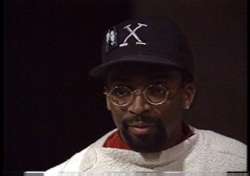 in both French and English versions, with the former presented here on DVD. The charming storyline follows two siblings, Toby (Starr) and Liz (Anick) whose family temporarily decides to foster a young Cambodian boy, Hoang (Uk). The three children soon discover a crippled railroad engineer in the woods who sparks a string of fantasies and wild ideas which culminate in their decision to take an abandoned train back to Cambodia to reunite the boy with his family. Though suitable for kids, this film is delightfully odd and fits in snugly with other nutty Canadian family fantasies from the same era like The Great Land of Small and The Peanut Butter Solution. Again the transfer is miles ahead of the dire VHS versions, though the low budget conditions are still evident in what is probably the best presentation possible for this title at the moment.
in both French and English versions, with the former presented here on DVD. The charming storyline follows two siblings, Toby (Starr) and Liz (Anick) whose family temporarily decides to foster a young Cambodian boy, Hoang (Uk). The three children soon discover a crippled railroad engineer in the woods who sparks a string of fantasies and wild ideas which culminate in their decision to take an abandoned train back to Cambodia to reunite the boy with his family. Though suitable for kids, this film is delightfully odd and fits in snugly with other nutty Canadian family fantasies from the same era like The Great Land of Small and The Peanut Butter Solution. Again the transfer is miles ahead of the dire VHS versions, though the low budget conditions are still evident in what is probably the best presentation possible for this title at the moment.
The third disc features a hodgepodge of Arrabal-related shorter works including “Farewell Babylon,” a 54-minute video piece by Arrabal featuring various clips from films interspersed with 1993 New York footage including appearances from some unexpected participants like Spike Lee. It’s a solid if odd bonus for completists, but casual viewers will be more rewarded by “Arrabal, Panik Cineast,” a one-hour documentary about the director in which his comments and clips are interspersed with stories about his involvement with the wild Panik theatrical movement, including some great interview footage with Alejandro Jodorowsky as well. Rounding out the disc is the longest and most difficult piece, the 66-minute “Borges: A Life in Poetry,” which covers the famous poet’s life in fractured snippets. All three of these appear to be shot on standard def video (even VHS in some cases), so don’t expect much in terms of visual quality; however, it’s a solid, packed bonus disc whose exclusive presence in the box set makes it a no-brainer for cult film collectors.
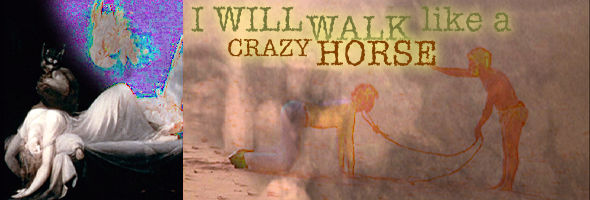
Color, 1973, 90 mins.
Directed by Fernando Arrabal
Starring George Shannon, Hachemi Marzouk
Cult Epics (US R0 NTSC) / WS (1.85:1) (16:9)
Three years after the incendiary cinematic bomb of Viva la Muerte, surrealist Fernando Arrabal returned with this more thoughtful, character driven study of nature versus society, though as usual his visuals are no less outrageous. More sexually explicit but less violent than its predecessor, I Will Walk like a Crazy Horse (J'irai comme un cheval fou) has remained rarely seen since its European debut, 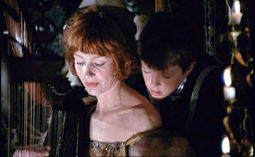 making it a jaw-dropping surprise for those brave enough to brave its waters.
making it a jaw-dropping surprise for those brave enough to brave its waters.
Haunted by violent, eroticized memories of his domineering mother, businessman Aden (Sugar Cookies' George Shannon) retreats in his jeep to the desert where he encounters Marvel (Hachemi Marzouk), a diminutive, shaman-like being who possesses the ability to fly through the air and change day to night. Smitten with his savior, Aden convinces Marvel to return to the industrialized city, where Marvel experiences a number of bizarre encounters including being rolled around naked in a giant plastic ball. Disillusioned by their environment, the two men return to the desert for a gruesome, transcendent finale, but not before Aden reveals the entire story behind his inner torment.
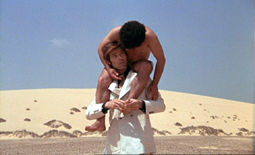 Typical of avant garde films from the period, Crazy Horse studs its mostly linear storyline with a series of peculiar, interstitial-style reveries which comprise some of its most memorable moments: a cross-dressing Aden in a coffin giving birth to a skull, a couple in gas masks making love, and so on. Visually slick and making admirable use of the striking desert locales, Arrabal's film is polished enough to pass for mainstream product even when it's strictly at odds with the content, which is still extreme enough to pack a punch.
Typical of avant garde films from the period, Crazy Horse studs its mostly linear storyline with a series of peculiar, interstitial-style reveries which comprise some of its most memorable moments: a cross-dressing Aden in a coffin giving birth to a skull, a couple in gas masks making love, and so on. Visually slick and making admirable use of the striking desert locales, Arrabal's film is polished enough to pass for mainstream product even when it's strictly at odds with the content, which is still extreme enough to pack a punch.
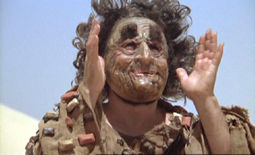 Cult Epic's DVD sports a spotless anamorphic transfer, with sharp detail and beautifully saturated colors. The French dialogue (with the American Shannon looped by an other actor) sounds fine, while the optional English subtitles are always legible and well written. The disc includes extensive liner notes by critic Rayo Casablanca, a trailer for Viva la Muerte (while that disc contains the trailer for this film), a lobby card gallery, and of course, a video interview with Arrabal, which is even more endearingly irrelevant than its companion piece on the Viva DVD. His anecdotes about the two actors are priceless and more than a little puzzling, while he once again resorts to posing with his chair, apparently to prove a point.
Cult Epic's DVD sports a spotless anamorphic transfer, with sharp detail and beautifully saturated colors. The French dialogue (with the American Shannon looped by an other actor) sounds fine, while the optional English subtitles are always legible and well written. The disc includes extensive liner notes by critic Rayo Casablanca, a trailer for Viva la Muerte (while that disc contains the trailer for this film), a lobby card gallery, and of course, a video interview with Arrabal, which is even more endearingly irrelevant than its companion piece on the Viva DVD. His anecdotes about the two actors are priceless and more than a little puzzling, while he once again resorts to posing with his chair, apparently to prove a point.


 Most seasoned film fans had little to no familiarity at all with director Fernando Arrabal when Cult Epics unleashed two of his most startling films, Viva la Muerte and I Will Go like a Crazy Horse, as standalone DVD editions and then a later box set with another film, The Guernica Tree. Surreal, aggressive, smart, and often hysterical, these films were best received among fans of the director’s closest contemporary, fellow Panik Movement innovator Alejandro Jodorowsky, whose own return to prominence on DVD around the same time signaled an unusual cosmic harmony among the cinematic powers that be. Cult Epics’ second batch of Arrabal titles is
Most seasoned film fans had little to no familiarity at all with director Fernando Arrabal when Cult Epics unleashed two of his most startling films, Viva la Muerte and I Will Go like a Crazy Horse, as standalone DVD editions and then a later box set with another film, The Guernica Tree. Surreal, aggressive, smart, and often hysterical, these films were best received among fans of the director’s closest contemporary, fellow Panik Movement innovator Alejandro Jodorowsky, whose own return to prominence on DVD around the same time signaled an unusual cosmic harmony among the cinematic powers that be. Cult Epics’ second batch of Arrabal titles is  definitely not meant to be approached for anyone unfamiliar with at least one or two of his other films, but for those who know what they’re getting into, prepare for six hours of mind-spinning madness you’ll never forget.
definitely not meant to be approached for anyone unfamiliar with at least one or two of his other films, but for those who know what they’re getting into, prepare for six hours of mind-spinning madness you’ll never forget. character, Emanou (Banshing), is also something of a musical savior (not named Tommy, however) whose plans for a grand live finale are thwarted exactly as you might expect. Not surprisingly, this originated as a stage play by Arrabal (and which was revived as recently as 2007 onstage in the UK), who has written over a hundred works for the stage, believe it or not. For most this will be the prize of the set as it closely reflects its creator’s style and vision, mixing social commentary, dark comedy, and plain weirdness together in a unique setting composed mainly of a nocturnal junkyard filled with dismembered vehicles creating odd and striking visual tableaux. Cult Epics’ disc, the first DVD availability anywhere in the world, claims to be a new HD transfer and certainly looks it, with excellent visual details and color fidelity in evidence throughout. The 1.66:1 framing looks accurate as well; there’s really nothing to complain about at all with the presentation here, and the optional English subtitles for the French dialogue are excellent. This is also the only film of the set available separately.
character, Emanou (Banshing), is also something of a musical savior (not named Tommy, however) whose plans for a grand live finale are thwarted exactly as you might expect. Not surprisingly, this originated as a stage play by Arrabal (and which was revived as recently as 2007 onstage in the UK), who has written over a hundred works for the stage, believe it or not. For most this will be the prize of the set as it closely reflects its creator’s style and vision, mixing social commentary, dark comedy, and plain weirdness together in a unique setting composed mainly of a nocturnal junkyard filled with dismembered vehicles creating odd and striking visual tableaux. Cult Epics’ disc, the first DVD availability anywhere in the world, claims to be a new HD transfer and certainly looks it, with excellent visual details and color fidelity in evidence throughout. The 1.66:1 framing looks accurate as well; there’s really nothing to complain about at all with the presentation here, and the optional English subtitles for the French dialogue are excellent. This is also the only film of the set available separately.  in both French and English versions, with the former presented here on DVD. The charming storyline follows two siblings, Toby (Starr) and Liz (Anick) whose family temporarily decides to foster a young Cambodian boy, Hoang (Uk). The three children soon discover a crippled railroad engineer in the woods who sparks a string of fantasies and wild ideas which culminate in their decision to take an abandoned train back to Cambodia to reunite the boy with his family. Though suitable for kids, this film is delightfully odd and fits in snugly with other nutty Canadian family fantasies from the same era like The Great Land of Small and The Peanut Butter Solution. Again the transfer is miles ahead of the dire VHS versions, though the low budget conditions are still evident in what is probably the best presentation possible for this title at the moment.
in both French and English versions, with the former presented here on DVD. The charming storyline follows two siblings, Toby (Starr) and Liz (Anick) whose family temporarily decides to foster a young Cambodian boy, Hoang (Uk). The three children soon discover a crippled railroad engineer in the woods who sparks a string of fantasies and wild ideas which culminate in their decision to take an abandoned train back to Cambodia to reunite the boy with his family. Though suitable for kids, this film is delightfully odd and fits in snugly with other nutty Canadian family fantasies from the same era like The Great Land of Small and The Peanut Butter Solution. Again the transfer is miles ahead of the dire VHS versions, though the low budget conditions are still evident in what is probably the best presentation possible for this title at the moment. 
 making it a jaw-dropping surprise for those brave enough to brave its waters.
making it a jaw-dropping surprise for those brave enough to brave its waters.  Typical of avant garde films from the period, Crazy Horse studs its mostly linear storyline with a series of peculiar, interstitial-style reveries which comprise some of its most memorable moments: a cross-dressing Aden in a coffin giving birth to a skull, a couple in gas masks making love, and so on. Visually slick and making admirable use of the striking desert locales, Arrabal's film is polished enough to pass for mainstream product even when it's strictly at odds with the content, which is still extreme enough to pack a punch.
Typical of avant garde films from the period, Crazy Horse studs its mostly linear storyline with a series of peculiar, interstitial-style reveries which comprise some of its most memorable moments: a cross-dressing Aden in a coffin giving birth to a skull, a couple in gas masks making love, and so on. Visually slick and making admirable use of the striking desert locales, Arrabal's film is polished enough to pass for mainstream product even when it's strictly at odds with the content, which is still extreme enough to pack a punch.  Cult Epic's DVD sports a spotless anamorphic transfer, with sharp detail and beautifully saturated colors. The French dialogue (with the American Shannon looped by an other actor) sounds fine, while the optional English subtitles are always legible and well written. The disc includes extensive liner notes by critic Rayo Casablanca, a trailer for Viva la Muerte (while that disc contains the trailer for this film), a lobby card gallery, and of course, a video interview with Arrabal, which is even more endearingly irrelevant than its companion piece on the Viva DVD. His anecdotes about the two actors are priceless and more than a little puzzling, while he once again resorts to posing with his chair, apparently to prove a point.
Cult Epic's DVD sports a spotless anamorphic transfer, with sharp detail and beautifully saturated colors. The French dialogue (with the American Shannon looped by an other actor) sounds fine, while the optional English subtitles are always legible and well written. The disc includes extensive liner notes by critic Rayo Casablanca, a trailer for Viva la Muerte (while that disc contains the trailer for this film), a lobby card gallery, and of course, a video interview with Arrabal, which is even more endearingly irrelevant than its companion piece on the Viva DVD. His anecdotes about the two actors are priceless and more than a little puzzling, while he once again resorts to posing with his chair, apparently to prove a point.